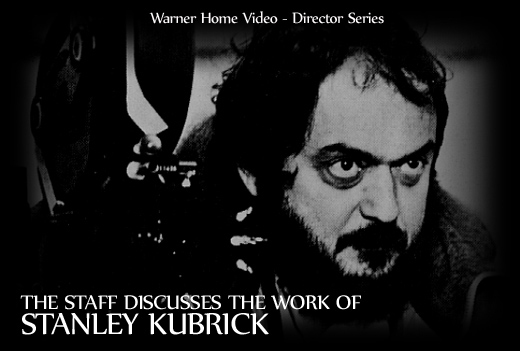
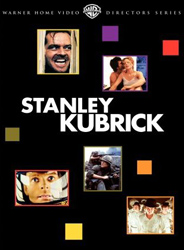 BUY IT AT AMAZON: CLICK HERE
BUY IT AT AMAZON: CLICK HERE
STUDIO: Warner Bros.
MSRP: $28.98
RATED: PG-13
RUNNING TIME: 122 Minutes
SPECIAL FEATURES:
- Jerry Weintraub Walk & Talk
- Additional Scenes
- Vegas: An Opulent Illusion
The Pitch
The popular casino heist/celebrity showcase returns for the last time, but we hope not!
The Humans
Director/Cameraman: Steven Soderbergh
Cast:
George Clooney, Brad Pitt, Matt Damon, Andy Garcia, Don Cheadle, Bernie
Mac, Ellen Barkin, Al Pacino, Casey Affleck, Scott Caan, Eddie Jemison,
Shaobo Qin, Carl Reinder, & Elliott Gould
Writers: Brian Koppelman & David Levien
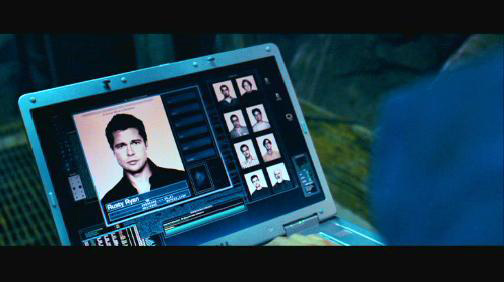
"Eve, do you think our story should be taught in schools?"
"Shut up and go interact with that Stegosaurus."
The Nutshell
The
legendary battle at the Hot Gates stands as one of the more unique and
seemingly fantastical stories in history, a tale of few against many
and a moral king against a seriously amoral one. Was it real or
imagined? Is it a tale akin to today’s political climate? Modern
allegory has been read into this film just as the semi-classic The 300 Spartans
was analogous to The Cold War. Screw all that. This is war as filtered
through the heightened and acute lens of Zach Snyder. A comic book
movie turned experimental art film. Shut up and enjoy!
The Lowdown
2001: A Space Odyssey
The first time I watched 2001, I was in the company of someone that was
baked out of their mind. Listening to their running commentary during
the film cost me a lot of opportunities to really dig into one of
Kubrick’s masterworks and I’m forever plagued with snippets from that
first viewing. The one that sticks in my memory and comes up whenever I
see the flick is the friend’s comments about the finale. It wasn’t
anything dumb about the Spacechild or the light show that marks the
beginning of the Third Act.
He leaned over to me and said with the straightest face, “I liked it
better when it was about the monkeys”. The fact that he could look past
everything that was place onscreen and boil down the entire film to a
band of monkeys blew my mind. So, when I think of 2001 now, I think of
that comment. Thank you, man. Eight years later and you’re still
ruining movies for me. – Troy Anderson
2001 is a movie that I find something new to digest with every viewing.
Back in 1982 my mother took me to a dollar cinema and along the way she
kept trying to explain to me what the movie was about. "You’ll see some
monkeys but this is NOT just about them", "You’ll have lots of
questions afterwards". She seemed so excited about sharing this movie
with me I was getting worried and ask myself "What if I don’t like it?"
For the first time in my young movie going experience I just sat there
in awe and even though I could not grasp the deeper meaning of 2001 I
could at least appreciate the fact that I was watching something
amazing. After the movie was over and we had gone back to the car Mom
was sitting there all wide-eyed waiting for me to overload her with
questions. What did I do? I just sat there looking back at her
wide-eyed with no questions. For a moment I thought she was going to be
disappointed and then she just grinned. The look on my face was all she
needed to see as she knew that what I had just experienced with a movie
was something special. – Eileen Bolender
My mom rented a videotape copy of 2001 from the library when I was
about six years old. I loved science fiction so she figured it was set
in space, in the future, so why not? Except of course the
science-fiction I was a fan of at the time featured either Wars or
Treks in their titles and after about ten-minutes of monkey skull
bashing (“Is this Planet of the Apes?” my dad asked) the movie got shut
off right quick.
Years later in high school, after watching A Clockwork Orange and The
Shining, I returned to 2001, and it helped define the way I looked at
movies. Movies stopped becoming movies after 2001 and started becoming
film. I wasn’t aware of poetry in the cinema before 2001. I wasn’t
aware of how much you could do with a film, what you could suggest,
where it could lead analytical thinking. The film’s tag-line might have
been “the ultimate trip” to cash in on the acid-dropping crowd of the
late 60’s, but it’s universally appropriate. Not only does it factor
into the plot, it represents a shift in movie-making (and for me,
movie-watching). You’ll never see another movie like 2001, so in some
ways, it’s the movie to end all movies, charting the ultimate human
story, from pre-evolved ape to reborn star god. How fitting that a film
about evolution and the triumph of humanity over machinery was my
gateway into the real, beautiful possibilities of film and cinema being
looked at as an art form rather than simply entertainment. – Jeff Van Dreason
A Clockwork Orange
What’s more moral? A man who is free, vibrant and thinks only of
himself, commits horribly violent acts including theft, rape, murder?
Or a society that forces a man to behave, enforces morality into his
mind against his will and then uses him as a political pawn? I feel
like A Clockwork Orange is a gateway film for a lot of young people
into the world of Stanley Kubrick, but I’m afraid that often what
attracts them is the “cool stuff,” by which I mean the incredibly
eye-popping visuals, costumes, violence and absurdity (including the
fantastically fun Nadsat dialogue, lifted faithfully from Anthony
Burgess’ novel). I find this unfortunate, for as sure as A Clockwork
Orange is a controversial film, an eye-catching film, a violent film;
it’s also an incredibly thoughtful one.
A Clockwork Orange becomes more relevant every year. Whenever we hear
about someone going on a mass killing spree or doing something truly
appalling, we ask ourselves how it could happen. Why don’t they think
of other people? Why are they thinking solely of themselves? Kubrick’s
answer is that they were raised that way. His young Alex is a product
of his society, a vibrant slice of life (or, orange) going through the
motions (like clockwork, see?). Alex is evil, but are his acts of crime
any worse then the torturous prison treatment he receives? Or the
punishing greeting he gets from his former gang members when he’s
released from prison? Or his family’s willingness to quickly move on
without him? Or a murder attempt from an old man, effected by Alex’s
former crimes, driven to vengeance and attempting to use Alex in a
political move? Or the government, willing to give Alex a job to use
him as an example of rehabilitation? There are no easy answers in A
Clockwork Orange, but the questions it raises can leave you thinking
for days. – Jeff Van Dreason
The Funeral March for Queen Mary is a stark introduction into a highly
stylized dystopian future. A gang of four drink narcotic laced milk at
a local bar, while waiting for the bloodlust to kick in for a night of
ultraviolence. The face of the urban punk had been seen by Kubrick and
it wore a bowler. I was introduced to A Clockwork Orange, while
visiting a college film class during one of my many college visits
during those years when I was trying to decide on a secondary education
habitat.
Watching a professor break apart every inch of “The Thieving Magpie”
gang fight to point every little detail was an exercise in the exciting
tedium of appreciating film. What still kills me about this approach is
how it works for a Kubrick film. From the SS hat on the rival gang
member’s head to the perfect proscenium positioning of the fight shows
an attention to detail that is found in film anymore. Kubrick invites
us all into the sheer desire and design to invite the audience into the
ultraviolence, while giving us a calm narrator to make us imbibe the
carnage. In a lesser age, the man would’ve been called a pornographer. – Troy Anderson
The Shining
A ghost exists in the reflections of the demons that we can’t stare in
the face. I’ve been talking about this film a lot recently. When I was
talking to a British fan, he brought up the fact that he didn’t notice
a major detail until viewing the recently release Kubrick set from
Warner Brothers. At first, Jack Torrance can bring himself to deal with
the stress of a family that is growing away from him. He’s no longer
the stable provider that can support a family.
Taking care of the Overlook Hotel is a last ditch job, while he tries
to pull it all together and write that novel that’s going to save his
life. But, the novel is going nowhere and he’s fighting with his wife
over what to do with their freaky kid. That’s where we find the real
beauty in the piece as Jack finds Lloyd and Grady. At first, he can’t
bare to look at them. But, he’s more than willing to follow their
commands. As soon as he can accept the horrors of Room 237 and love the
demons that dwell within his fractured soul, Jack comes to realize a
universal truth. He has always been at the Overlook. It’s just his
miserable life has been the purgatory awaiting the chance to return to
the icy pits of Hell. – Troy Anderson
The Shining was the first Stanley Kubrick movie I saw. I used to wait
up in my room until my parents went to bed, then sneak downstairs and
check out channel five for the Saturday Night Late Movie. I’ll never
forget the times I turned it on in the middle of Altered States or the
clown scene from Poltergeist. I had quite a few nightmares thanks to
the channel five Saturday Night Late Movie, but none were as severe as
the dead girls from the Shining, staring down into my soul ready to rip
it right out of my heart and eat it in front of my useless, dying
vessel. Imagine turning on the television and seeing a child rolling
down a hallway on his big-wheels, only to round the corner to confront
two creepy twins. Then, a flash of the same twins axed into bloody
quintuplets on the floor. I remember I recoiled from the television. I
didn’t want to touch it, not even to turn it off. So, I didn’t. I
stayed up the rest of the night and watched it to the terrifying last
shot of Jack, frozen forever inside a photograph, and I shivered my way
through the credits. I didn’t understand what that could possibly mean
at the time, but it sent my mind reeling in spirals of fear that
culminated in some of the worst nightmares I’ve ever had in my life.
There are few things more unifying in all horror movies as “the creepy
twins from the Shining.” Everyone has their own story about
encountering them for the first time, but I’ve never met anyone who
said they didn’t find them scary that I truly believe. The Shining is a
truly odd, frightening film. It has a wildly strange performance from
Jack Nicholson, who acts like Captain Alcoholic from the first frame.
It has a dead woman in a bathtub. It has an elevator full of red
Kool-Aide blood (“Oh, yeah!”). It has the hedge maze from hell, a kid
talking to his finger and a guy giving a blow job in a bear suit. But
nothing beats those twins, looking straight into my eyes and whispering
in a faint English accent, “Come and play with us, Danny.” It’s their
polite invitation that does it, and their odd synchronized departure
that still haunts my dreams. I look for them in long hallways
sometimes. And I shudder at the possibility of meeting them, even if
it’s just for a few minutes in a very bad dream. – Jeff Van Dreason
Full Metal Jacket
When I look back at this flick, I still can’t over how Gomer Pyle
blowing his brains out in the toilet killed the film for me. It’s not
because I was attached to Pyle or even the Gunny. It’s just that the
second half of the film falls apart once it hit Vietnam. Sure, it
would’ve been difficult keeping a movie totally focused on the Paris
Island aspect of the story. Yet, I feel that’s where the meat of the
story existed.
Private Joker and the rest of his company arrive in the hell of Hanoi
only to discover that everything is as pointless as what came before.
Sure, you get the scene with the Vietnamese hooker who’ll love you long
time. But, what else is there after that? Hot Animal Machine blasting
the enemy from the side of a helicopter only drives home what happened
before. The War is pointless and it’s a mechanical system that will
continue and continue as long as there are cogs to be placed into the
greater scheme.
Right before Pyle shot himself in the Barracks’ toilet, he summed up
the film’s tone in a couple of words. “I am…in a world…of shit.”
It’s bleak as hell and it sums up everything that the fresh-faced doe
eyed American young men realize, as they enter a war of warfare where
they are nothing more than cannon fodder. Sure, Pyle comes to the point
of realization first, as he figures out that if he can’t handle the
Gunny’s shit in Basic Training, the combat in Southeast Asia is going
to break him down into nothing. He’s fucked in every direction and he
realizes that death is the only way out.
The point is driven home for the second time, which is part of the
reason why I hate the repetitive nature of the film. In hindsight, it
does serve to strengthen Private Joker’s arc. The young man starts with
a bad John Wayne impersonation and he ends up figuring out that “the
shit” is everywhere. But, he also has the knowledge of what Pyle did
and what the act means. Joker says the following some time after Pyle’s
death, “The dead know only one thing: it is better to be alive”. Taking
a cue from that Jungian duality of man that he explained to a
commanding officer, Joker has come to both sides of life in combat.
Joker isn’t willing to get picked off by some random asshole in a
burned out building, and he’s not going to give up and let the military
life drag him down. He’s a reporter by trade and he’s going to keep an
eye on the experience of a life in shit. Watching a young man have the
humor driven out of him and replaced with the need to capture the
horror of mindless violence is horror on a level that we don’t
acknowledge. It’s not as exciting as watching a couple of kids on a
backpacking trip getting taken to a torture camp. But, it’s horror
nonetheless. – Troy Anderson
Eyes Wide Shut
Eyes Wide Shut is the girl in high school with the bad reputation. You
hear rumors about how much of a slut she is, so you decide to find out
for yourself. You cozy up to her at the kegger. You converse with her a
bit. She tells you some gobbly gook about philosophy or human nature or
something. You don’t really know what she’s talking about. But you
smile and nod, trying not to stare at her tits. All in the hope that
the inevitable action will be worth the boredom. Then she goes to
refill her cup and never comes back. So you go home, disappointed and
frustrated. Eventually you end up spending more time with her. Maybe
you are in the same study group. Or you end up talking to her at
another party. This time, you actually listen to her while she’s
talking. You begin to notice things. Her sense of humor. Her style. Her
confidence. You begin to appreciate her for who she really is. – Alex Hansen
Some people went nuts over The Phantom Menace during the summer of
1999. I was on a Kubrick kick following his death in March of that
year. I wanted to get deeper into film and as a high school senior…I
latched onto the nearest master director that was floating in the
ether. I remember seeing the final trailer premiere to the sounds of
Chris Isaak. They were good times.
Then, I got to listen as a general audience tried to make sense of a
sex drama/fantasy about the boredom of monogamy in the Modern Age. I’d
go around and ask people what they thought of it and I was stunned.
There’s the whole issue of hitting a target audience, but everyone
enters into interpersonal relationships at one point of their life.
Yet, people couldn’t understand the frustration of having no adventure
anymore. The dangers of complacency and an open market to chase all
matters of freaky tail didn’t entice anyone into giving this a shot.
So, when the Academy Awards rolled around…I wasn’t surprised to see
that the film got snubbed.
It’s an amazing thing to revisit this film after so many years.
Watching the recent release on DVD, I’m dumbstruck by the fact that
this film didn’t breakthrough to a mass audience. There a ton of people
out there watching “Tell Me You Love Me”, yet they can’t make the time
to give this film a shot? I could go around in circles trying to figure
out where the appeal was lost. But, I want to leave anyone that reads
this with something to consider.
Nicole Kidman is a passive vessel for the duration of this flick,
except for the tale of her lustful dream of a sailor from long ago. She
uses this story while high to taunt her husband and provoke him into
action. But, as a broken vessel, Cruise can’t process the instigation
in the proper way. As we watch Cruise’s trek through the nocturnal
world, do you buy that he wants to go back to the monogamous safety of
a life with Kidman? Or was it a fear of something like AIDS, violence
from outside forces or the eventual exposure of his sexual desires that
pushed him to the safety of his wife? I appreciate that I can have
these questions and I wish more filmmakers were interested in the
journey and a lot less about a grand finale. – Troy Anderson
“Fuck.”
That’s the last line of the last shot from the last film from one of
cinema’s greatest directors, and it’s a line that drips with hope. Hope
isn’t a sentiment often tied to Stanley Kubrick, and it’s not evident
in all of his films. But for every bleak critique he crafted, dripping
with derision aimed at humanity and our thirst for violence, hypocrisy
and self-destruction, there’s the star child in 2001, there’s the
French song at the end of Paths of Glory, there’s a couple coming to
terms with their marriage at the end of Eyes Wide Shut. After Tom
Cruise spends about two and a half hours on a sex odyssey (everyone he
encounters during his wild night on the town reacts to him sexually),
he comes home to his wife, whose confession sent him reeling and
searching in the first place. They wander around a toy store, there
kids picking out presents, and they discuss their future.
Kubrick thought they had a future, or at least thought they deserved to
try to have one. So if some find that last line ironic, crass or in
poor taste, they’re simply wrong. It showed that despite our faults,
Kubrick still had faith in the best parts of human behavior, the parts
that enable us to set aside our differences, figure something out and
come together (even if it is coming together in its most primitive
form; sexually). I know not everybody loves this movie, and to be
honest, it’s not nearly my favorite of his films. But I think it’s a
fitting end, worthy of sitting alongside his other giants, and a
fantastic capper to one of the most consistent resumes of auteur cinema. – Jeff Van Dreason
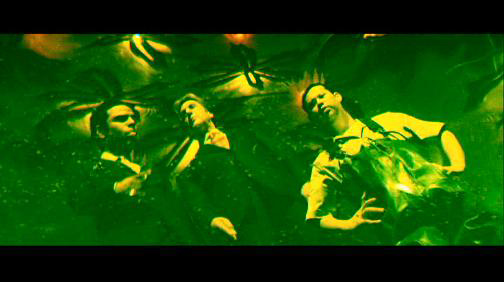
Now I know why Dana Carvey’s been out of the public eye.
Gerard
Butler is Leonidas, a Spartan warrior king trained from childhood to
conquer. We learn this as we see the man crush his enemies and defeat a
rather large CGI wolf. We also learn he is a loving husband and father
[and how could you not be were your wife the lovely Lena Headey?] as
well as a man’s man and a leader with true grit. He is also a Spartan,
something not to be taken lightly. In the film’s first confrontation, a
centerpiece to the film’s marketing, Leonidas deals with a Persian
messenger by kicking him into an abyss. This lead to the modern
catchphrase "Don’t Kick the Messenger Into An Abyss".
Leonidas
is an amazing central character for a film, a hero who rushes to face
his enemies. One who craves a good death. It’s extremely rich cinema,
especially in a time where heroic icons in films both modern day and in
retro epics tend to feel the need to deliver a cool line or do their
work in a way more cool than functional. The really great send-off in 300,
the "we’ll fight in the shade" line, doesn’t even come from Leonidas
but rather a soldier who looks a little like David Lee Roth circa Women and Children First.
Leonadas is a man of action, vividly displayed here in Snyder’s
sequences which merge several cameras, several speeds, and several
perspectives in a manner that truly works as muscular and exciting
filmmaking.
Make no mistake, this is a showy film. Miller’s graphic novel and the events they’re based on are very singular. This is not Spartacus or Gladiator,
both of which are action films masked by meaty and complex stories.
This is a lean and mean action film that just happens to take place in
acnient times. It’s the saving grace of 300, its willingness to be a jack of one trade and to do it very, VERY well.
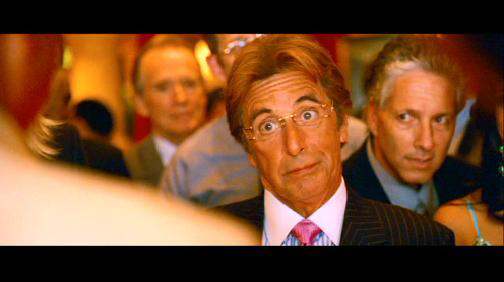
"But you’re too big to be Kuatooooooooooooommmmppppppppph!"
The
battles are quite breathtaking and the decision to shoot the film
almost entirely against a greenscreen could have been distracting if
the style and palette wasn’t confidently rendered. The film is a beast,
a nice mix of big moments and wonderfully brief ones. Seeing hordes of
Persians defeated effortlessly by crashing waves and rocks is a nice
counterweight to the quick dispatching of the first wave at the mouth
of the Hot Gates (Thermopylae), which dovetails perfectly into the
moment where the soldiers deal with a sky-blocking assaultof arrows.
It’s not drawn out and when the air clears there are some excellent
character moments for all of the principals.
Where the film falters is in the moments where it feels familiar, whether it be the somewhat silly [but pivotal] hunchback Ephialtes,
the treachery of the politicians back home, or the moments with the
Oracle which lean Leonidas to his fateful decision. Additionally, the
villains, though they may be cool, scary, and larger-than-life, are
very much scaled back in their conception. Xerxes is a giant and odd
creation and the Persians are mostly just fodder for the blade. The
film doesn’t need to create much personality for the adversaries but I
can see how some viewers may be disappointed in their lack of
development.
There’s a definite sense of "been there, done that" at times, but 300 always gets back on course whenever Butler and his men are front and center.

Looks just like the comic. Sadly, that comic is not Ambush Bug #3.
This is a career
defining role for Butler, one which elevates him from a great
supporting character to a charismatic leading actor. His work, though
less complex than Russell Crowe’s similarly effective work as Maximus,
is just as memorable. With his steely eyes and jutting beard
Butler’s Leonidas is someone you could believe 300 men or 3,000 would
gladly follow to Hell’s flames. That’s the simplicity of this story and
this film which is so wonderful. Less concerned with a message than
telling a great story without fear of being too extreme in the
presentation [there’s even a little rock music layered in there], Zach
Snyder’s 300
is a film that not only announces a truly interesting filmmaking talent
but also reminds you that you don’t have to re-invent the wheel if you
have some really bitchin’ spinners on it.
The Package
Thank
Xerxes we don’t have to crave a double-dip any time soon. The DVD
features a truly terrific and informative commentary track starring the
film’s auteur. The amount of work in creation here is astounding and
though in a way it’s not dissimilar to the way George Lucas shot the Star Wars prequels it feels a lot more genuine here. Snyder has seemingly limitless energy, something which bodes well for his Watchman adaptation, because the mixture of Dawn of the Dead, 300, and Alan Moore’s amazing prose suggests a wonderfull cocktail.
Additionally,
there’s a treasure trove of supplements on the second disc, mostof
which are not only worth seeing but ones which actually enhance the
experience. Though I personally find the film to be extremely
heightened, it’s nice to see that the crew involved historians and made
the effort to have the DVD be as informative as possible without losing
the electricity and skull-smashing fun of the film.
This is definitely one for the shelves, and the art, especially with the cardboard slipcase, is seriously badass.
9.0 out of 10
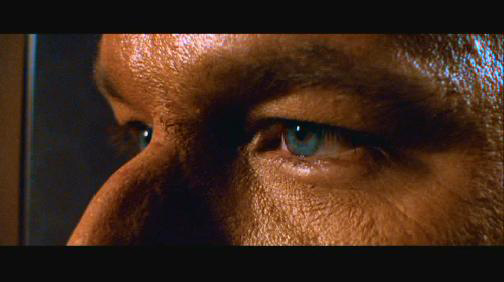
Hollywood Secret #498 – Gerard Butler has Mel Gibson’s ass and Charles Durning’s shadow.